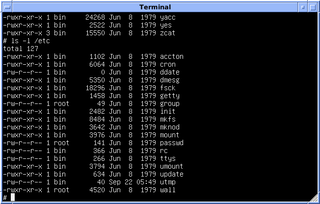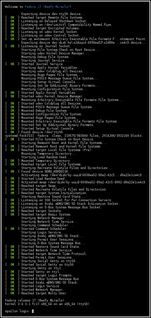
GNU Hurd is the multiserver microkernel written as part of GNU. It has been under development since 1990 by the GNU Project of the Free Software Foundation, designed as a replacement for the Unix kernel, and released as free software under the GNU General Public License. When the Linux kernel proved to be a viable solution, development of GNU Hurd slowed, at times having slipped intermittently between stasis and renewed activity and interest.

Security-Enhanced Linux (SELinux) is a Linux kernel security module that provides a mechanism for supporting access control security policies, including mandatory access controls (MAC).
A background process is a computer process that runs behind the scenes and without user intervention. Typical tasks for these processes include logging, system monitoring, scheduling, and user notification. The background process usually is a child process created by a control process for processing a computing task. After creation, the child process will run on its own, performing the task independent of the control process, freeing the control process of performing that task.
Unix security refers to the means of securing a Unix or Unix-like operating system. A secure environment is achieved not only by the design concepts of these operating systems, but also through vigilant user and administrative practices.
In computing, the superuser is a special user account used for system administration. Depending on the operating system (OS), the actual name of this account might be root, administrator, admin or supervisor. In some cases, the actual name of the account is not the determining factor; on Unix-like systems, for example, the user with a user identifier (UID) of zero is the superuser, regardless of the name of that account; and in systems which implement a role based security model, any user with the role of superuser can carry out all actions of the superuser account. The principle of least privilege recommends that most users and applications run under an ordinary account to perform their work, as a superuser account is capable of making unrestricted, potentially adverse, system-wide changes.
The printing subsystem of UNIX System V is one of several standardized systems for printing on Unix, and is typical of commercial System V-based Unix versions such as Solaris and SCO OpenServer. A system running this print architecture could traditionally be identified by the use of the user command lp as the primary interface to the print system, as opposed to the BSD lpr command.
The cron command-line utility, also known as cron job is a job scheduler on Unix-like operating systems. Users who set up and maintain software environments use cron to schedule jobs to run periodically at fixed times, dates, or intervals. It typically automates system maintenance or administration—though its general-purpose nature makes it useful for things like downloading files from the Internet and downloading email at regular intervals.
The Berkeley r-commands are a suite of computer programs designed to enable users of one Unix system to log in or issue commands to another Unix computer via TCP/IP computer network. The r-commands were developed in 1982 by the Computer Systems Research Group at the University of California, Berkeley, based on an early implementation of TCP/IP.
In computer programming and computer security, privilege separation is a technique in which a program is divided into parts which are limited to the specific privileges they require in order to perform a specific task. This is used to mitigate the potential damage of a computer security vulnerability.
udev is a device manager for the Linux kernel. As the successor of devfsd and hotplug, udev primarily manages device nodes in the /dev directory. At the same time, udev also handles all user space events raised when hardware devices are added into the system or removed from it, including firmware loading as required by certain devices.
Unix-like operating systems identify a user by a value called a user identifier, often abbreviated to user ID or UID. The UID, along with the group identifier (GID) and other access control criteria, is used to determine which system resources a user can access. The password file maps textual user names to UIDs. UIDs are stored in the inodes of the Unix file system, running processes, tar archives, and the now-obsolete Network Information Service. In POSIX-compliant environments, the command-line command id gives the current user's UID, as well as more information such as the user name, primary user group and group identifier (GID).

In Unix-based computer operating systems, init is the first process started during booting of the computer system. Init is a daemon process that continues running until the system is shut down. It is the direct or indirect ancestor of all other processes and automatically adopts all orphaned processes. Init is started by the kernel during the booting process; a kernel panic will occur if the kernel is unable to start it. Init is typically assigned process identifier 1.
In computing, privilege is defined as the delegation of authority to perform security-relevant functions on a computer system. A privilege allows a user to perform an action with security consequences. Examples of various privileges include the ability to create a new user, install software, or change kernel functions.

The architecture of Windows NT, a line of operating systems produced and sold by Microsoft, is a layered design that consists of two main components, user mode and kernel mode. It is a preemptive, reentrant multitasking operating system, which has been designed to work with uniprocessor and symmetrical multiprocessor (SMP)-based computers. To process input/output (I/O) requests, they use packet-driven I/O, which utilizes I/O request packets (IRPs) and asynchronous I/O. Starting with Windows XP, Microsoft began making 64-bit versions of Windows available; before this, there were only 32-bit versions of these operating systems.
In computing, D-Bus is a message-oriented middleware mechanism that allows communication between multiple processes running concurrently on the same machine. D-Bus was developed as part of the freedesktop.org project, initiated by Havoc Pennington from Red Hat to standardize services provided by Linux desktop environments such as GNOME and KDE.
In computer networking, xinetd is an open-source super-server daemon which runs on many Unix-like systems and manages Internet-based connectivity.
A number of computer operating systems employ security features to help prevent malicious software from gaining sufficient privileges to compromise the computer system. Operating systems lacking such features, such as DOS, Windows implementations prior to Windows NT, CP/M-80, and all Mac operating systems prior to Mac OS X, had only one category of user who was allowed to do anything. With separate execution contexts it is possible for multiple users to store private files, for multiple users to use a computer at the same time, to protect the system against malicious users, and to protect the system against malicious programs. The first multi-user secure system was Multics, which began development in the 1960s; it wasn't until UNIX, BSD, Linux, and NT in the late 80s and early 90s that multi-tasking security contexts were brought to x86 consumer machines.

Jami is a SIP-compatible distributed peer-to-peer softphone and SIP-based instant messenger for Linux, Microsoft Windows, OS X, iOS, and Android. Jami was developed and maintained by the Canadian company Savoir-faire Linux, and with the help of a global community of users and contributors, Jami positions itself as a potential free Skype replacement.

systemd is a software suite that provides an array of system components for Linux operating systems. Its main aim is to unify service configuration and behavior across Linux distributions; systemd's primary component is a "system and service manager"—an init system used to bootstrap user space and manage user processes. It also provides replacements for various daemons and utilities, including device management, login management, network connection management, and event logging. The name systemd adheres to the Unix convention of naming daemons by appending the letter d. It also plays on the term "System D", which refers to a person's ability to adapt quickly and improvise to solve problems. Since 2015, the majority of Linux distributions have adopted systemd, having replaced other systems such as the UNIX System V and BSD init systems. Systemd has faced mixed reception from Linux users, with arguments that systemd suffers from mission creep and bloat, as well as criticism over software adding dependencies on systemd—complicating compatibility with other Unix-like operating systems, and making it hard to move away from systemd. Concerns have also been raised about Red Hat and its parent company IBM controlling the scene of init systems on Linux.
Namespaces are a feature of the Linux kernel that partitions kernel resources such that one set of processes sees one set of resources while another set of processes sees a different set of resources. The feature works by having the same namespace for a set of resources and processes, but those namespaces refer to distinct resources. Resources may exist in multiple spaces. Examples of such resources are process IDs, hostnames, user IDs, file names, and some names associated with network access, and interprocess communication.





